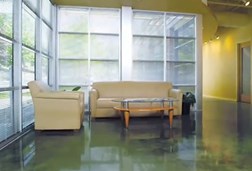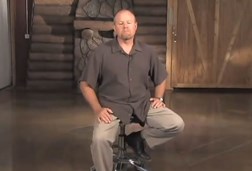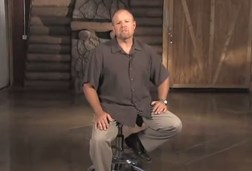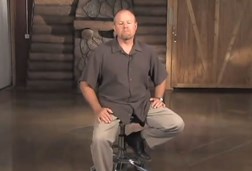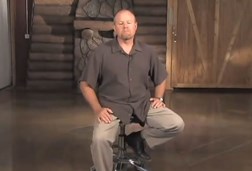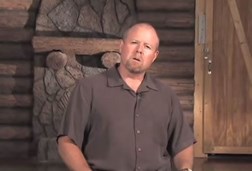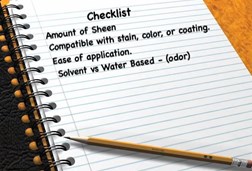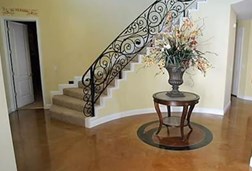- Design Idea Videos
- Floor Type Videos
- Common Question Videos
- Why Concrete Floors?
- Replacing Existing Floors
- Choosing a Floor Contractor
- Floor Maintenance Videos
- More Concrete Videos
- Floor Videos
- Countertop Videos
- Outdoor Living Videos
- Furniture Videos
- Demonstration Videos
- Concrete Tool Videos
- Concrete Stain Videos
- Sealer Videos
- Concrete Stencil Videos
- Concrete Stamps Videos
- Surface Preparation Videos
- Concrete Forms Videos
Maintaining Concrete Floors
"Floor Me" Video Series with Bob HarrisOne of the biggest benefits of concrete floors is their ease of maintenance. In these videos, expert Bob Harris examines the types of maintenance required for various concrete floor finishes. You will learn about how to maintain floors with light or heavy foot traffic, the types of floors that require low maintenance, and protective finishes necessary to keep floors looking great. Click below on one of the videos to learn about how to maintain concrete flooring:
Maintaining Concrete Floors with Heavy Foot Traffic
Time: 2:51
In a very aggressive environment, such as a shopping mall or casino, where foot traffic is heavy and continual, floor maintenance may be required two or three times per month or even more frequently. Bob Harris gives the example of the decorative concrete floors in The Forum Shops at Caesar's Palace in Las Vegas, where maintenance is an ongoing process because of the constant foot traffic. As a strategy for reducing maintenance, he recommends using floor mats both inside and outside entryways to keep dirt and grime off the floor surface.
Maintaining Concrete Floors with Light Foot Traffic
Time: 1:48
How much maintenance your concrete floor will need largely depends on the amount of traffic it receives. For floors that receive light foot traffic, such as residential floors, periodic maintenance is minimal if the floor has been preserved with a sealer and sacrificial wax.
Concrete Floors Require Little Maintenance
Time: 1:34
While concrete floors are relatively easy to maintain compared with other types of floor surfaces, they aren't completely maintenance free. How much maintenance your floor will need largely depends on the amount of traffic it receives. A good indicator that your floor is ready for maintenance, according to Harris, is when it begins to lose its luster or sheen. Cleaning of the floor and reapplying a coat or two of floor finish will normally bring it back to its original state.
Protective Finishes for Concrete Flooring
Time: 2:38
A sacrificial wax, or floor finish, can help your decorative concrete floor surface last indefinitely, as long as you are diligent about ongoing maintenance. The majority of floor finishes are water-based acrylic copolymers that can be applied by mop. There are also solvent-based waxes that are applied with a heavy-duty floor buffer. Here, Harris answers your questions about:
- Where to purchase floor finish products.
- How many coats to apply and how often.
- Hiring a contractor to maintain your floors.
- Why it's important to use a finish that's compatible with the floor sealer.
Using Sacrificial Floor Wax for Concrete Floors
Time: 1:29
Even if your floor is protected by a sealer, you also need to preserve the sealer by applying a sacrificial wear surface, often referred to as a wax or floor finish. Here are some of the reasons why, says Harris:
- A floor finish is easy to maintain and much easier to reapply than a sealer. Simply buff it out and reapply more when necessary.
- This sacrificial surface protects the sealer from wear and improves slip resistance.
- It not only makes the floor look nice, it also serves as a shock absorber to scuffs, scratches and grime.
Other Protective Finishes for Your New Concrete Floors
Time: 1:49
Harris describes other protective finishes that can be used as alternatives to sealers for protecting decorative floor surfaces. They include:
- Buff-in waxes, which provide a matte finish and are more penetrating than sealers. They will help to preserve the floor, but they won't protect from stains.
- A resin-based coating, such as an epoxy or polyurethane. This type of finish provides the ultimate in protection and produces the hardest surface, making it a good choice for high-traffic areas.
Concrete Sealer-Checklist of Factors to Consider
Time: 2:42
There are a wide variety of concrete sealers on the market. Harris tells you some of the key factors to consider when selecting the best product for your floor:
- Desired sheen level. This can vary from a natural matte look to a high-gloss finish.
- Compatibility with the floor finish.
- Ease of application.
- Solvent- vs. water-based. Solvent-based products are higher in odor and volatile organic compounds (VOCs).
- Scuff and abrasion resistance. This is especially important in high-traffic areas.
- Drying times.
- Cost. Generally, the more expensive the sealer, the better it will wear.
Why You Should Use a Sealer on Concrete Floors
Time: 1:30
Harris explains why you should always have your decorative concrete floor or overlay sealed after installation. Not only will a sealer bring out the beauty of your floor by enhancing the color and adding sheen, it will also preserve the decorative treatment by protecting the floor surface from abrasion and stains.
